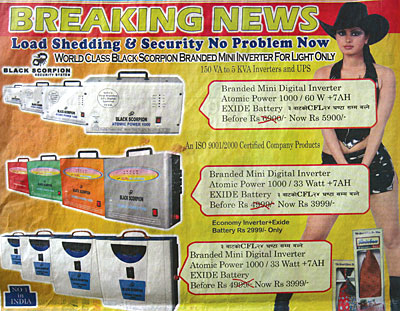�
 MOVING ON: Here's to hoping inverters have reached the end of the line |
I'm only writing this now, in the depths of darkest loadshedding, because of the sun.
Thanks to a new 20W photovoltaic solar panel, I can not only charge my laptop and light a couple of energy-efficient bulbs, but also charge my internet modem. This allows for a quick background check on the nice people at ECCA who sold me my solar system (battery included) for Rs 18,500: ECCA meaning Environmental Camps for Conservation Awareness, which developed the Solar Tuki to replace kerosene tukis in rural Nepal ('Tuki-free country', #258).
It's no big deal, you may say. My inverter/generator does just as much, and I can run everything in my house for about Rs 40,000. And when I went around announcing that I was now greener than the average Ram Bahadur Nepal, it was somewhat deflating to see even fellow children of the sun shrug and go, 'Ey, ho..?'
But I insist on making a big deal out of it. If I can tilt a panel less than 20"x20" across, run it through a small battery and have electricity pour out the other end, regardless of whether NEA has two hours of loadshedding a day or sixteen (at which point all your fancy inverters are just so much junk), why shouldn't it be a big deal? It's nothing less than magic. I had better point out that my panel is still indoors, as I haven't yet found a thief-proof spot, and works adequately.
In fact, it occurs to me that it is the rest of our energy-starved nation that is making a big deal out of solar energy, by not investing in it. Yes, solar energy is expensive � solar tukis cost Rs 3500 and are not affordable for many rural households without subsidies; larger home systems to run lights, a TV and a desktop computer can easily cost �Rs 150,000 � but prices are dropping steadily, and financing plans for Gham Power products are now available from companies such as the Clean Energy Development Bank. Without going into the nitty-gritty of how solar is worth it (I'll leave that to the experts), let me just say that solar is the only sure thing. Loadshedding may go up, diesel may be blockaded, hell, even the glaciers may evaporate and render hydropower obsolete, but the sun won't stop shining in Nepal. And photovoltaic panels last up to 25 years.
I confess also that while I was never blas� about the power of solar, the choice before me, a first-time buyer and consumer (discounting solar water), was paralysing. It didn't help when the front desk of one of the leaders in the field of solar energy, upon hearing I wanted a small system, nodded sadly and advised me to get an inverter, here's a number you can call. It was only when I saw a friend troop off to Doti with a portable package that I decided, definitively: I'm gonna get me one of them gizmos. And I did.
Like all innovations, it's not reading an article in a paper that'll get you on the phone to tap into gham power. It's your neighbour's house, inexplicably powered sans inverter or generator, while you miss out on World Cup 2010 and pray for an early monsoon. The system isn't going to work for you anytime soon. Don't wait for power, get your own. Now that's empowering.
ECCA � www.ecca.org.np
Gham Power � http://ghampower.com
Clean Energy Development Bank � www.cedbl.com/



